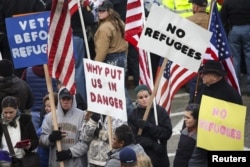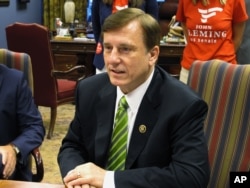The Obama administration’s proposal to admit 110,000 refugees next year has triggered vocal Republican opposition and perked up an old question: How many refugees can the United States take in without straining its financial resources?
The answer depends on whom you talk to. Refugee Council USA, a coalition of refugee advocacy organizations, last month called on the administration to admit 200,000 refugees in the coming year, up from 85,000 this year.
“I think the goal of 200,000 is a good number,” said Betsy Fisher, policy director for the International Refugee Assistance Project at the Urban Justice Center, a New York-based advocacy group and a member of Refugee Council USA. “It is a significant increase from current levels, but it’s still a tiny percentage of the U.S. population and a relatively small proportion of individuals who are in need of resettlement.”
High cost of resettlement
The president's Republican opponents contend that even current levels of refugee admissions are unacceptable. They say refugees pose security risks, and that the cost of resettlement is too high.
Republican Senator Jeff Sessions of Alabama, an adviser to presidential candidate Donald Trump and a supporter of the Republican businessman's immigration policy, blasted the administration’s latest plan as “reckless” and financially irresponsible.
“In addition to the very serious national security implications and the initial resettlement costs, admitting 110,000 refugees will result in an enormous long-term financial burden on the taxpayers,” Sessions said in a statement.
According to Sessions, the real cost of resettling refugees in the U.S. is much higher than the administration’s estimate of $1.5 billion a year. The senator cited an estimate by a Heritage Foundation scholar that put the “total lifetime cost” of admitting just 10,000 refugees at $6.5 billion. By that calculation, Sessions said, admitting 110,000 refugees would cost U.S. taxpayers $71.5 billion.
Other experts question those estimates, and proponents of more refugees say that while newly arrived refugees require benefits, over the long run they contribute to local economies.
Generosity a U.S. tradition
Historically, the U.S. has run a generous refugee resettlement program. In 1980, the country admitted more than 230,000 refugees, and through most of the following two decades, the number remained well above 100,000 a year, according to State Department data.
“Every president has brought a considerable number of refugees, so this is nothing new,” said Lavinia Limon, president and chief executive officer of the U.S. Committee on Refugees and Immigrants, a large refugee resettlement agency based outside Washington. “The president that brought the most refugees every year was President George Herbert Walker Bush. After that was President [Ronald] Reagan and President [Jimmy] Carter.”
But the number of annual refugee admissions has slipped under 100,000 in the 15 years since the attacks of Sept. 11, 2001, as the U.S. briefly stopped admitting refugees from countries with an al-Qaida presence and put in place tighter screening procedures.
Of the world’s 21 million-plus refugees today, less than 1 percent are resettled in Western nations. In comparison to its acceptance this year of 85,000 refugees, the U.S. yearly takes in about 1 million legal immigrants who are not refugees.
With the Syrian conflict sending millions scurrying for their lives in the worst migration crisis since World War II, the administration has found itself caught between a public backlash against Syrian refugees and growing international calls to do more for escapees from war and repression.
Other countries accept more
While Republicans have called for a halt to admitting Syrian refugees because of fears they might bring terrorists with them, international critics have argued that the world’s largest economy has the capacity to absorb a lot more than the 70,000 refugees it admitted in 2015. They point to Germany, which accepted nearly 800,000 refugees last year, and Sweden, which, with a population of only 10 million, took in more than 160,000.
Under pressure, the Obama administration increased the number of refugee admissions this year to 85,000, including 12,000 from Syria, and Secretary of State John Kerry told U.S. lawmakers this week that number would rise to 110,000 next year. The proposal was circulated ahead of two refugee summits in New York where President Barack Obama will call on world leaders to do more for refugees, but whether Congress will provide funding for his proposal remains to be seen.
Even so, refugee advocates say that the U.S., given the size of its economy and population, can take in even more.
“I don’t see any reason why we couldn’t be taking 200,000 to 250,000 people a year,” Limon of the U.S. Committee on Refugees and Immigrants said. “We have the capacity. We’re a huge, very wealthy nation.”
The U.S. has admitted about 3 million refugees over the past 40 years, with many settling in small towns such as Boise, Idaho, and Utica, New York, where they’ve remodeled houses and set up businesses to contribute to local economic revival.
'Productive members of our society'
“I think community support is still quite strong in places that have the experience of the refugee resettlement program, because by and large the program has been successful,” said Kathleen Newland, a senior fellow and co-founder of the Migration Policy Institute in Washington. “Refugees have arrived. They’ve been welcomed. They’ve integrated well, for the most part, and have in a pretty short period of time become productive members of our society.”
Sessions, the Republican senator and Trump supporter, said the Obama administration has ignored “the common-sense concerns of the American people" who oppose admitting more refugees.
Historically, public sentiment toward refugees has seemed to matter little in how many refugees the U.S. has admitted.
In fact, long before U.S. presidential candidates and other politicians began fanning fears of terrorists masquerading as refugees seeking shelter in America, the American public was less than welcoming toward refugees.
Presidents overlook opposition
Consider public opinion surveys during key periods of refugee admissions to the U.S.:
In 1959, a Gallup survey found that 55 percent of Americans opposed permitting a U.S. plan to resettle 56,000 people fleeing from communist Hungary.
In 1979, another poll found that 62 percent of the public opposed a government plan to double the number of refugees from Vietnam and other countries that formerly were part of French Indochina.
In 1980, 71 percent disapproved of recently arrived Cuban refugees resettling in the U.S.
But none of that stopped the U.S. from taking in large numbers of refugees from those countries.
Nation is divided now
In recent months, surveys have shown that most Americans remain opposed to Syrian refugees entering the country.
“We’re a divided nation,” Limon said.
Bipartisan support for the U.S. refugee resettlement program evaporated last year, as the Paris and San Bernardino attacks stoked fears that terrorists might infiltrate the flood of refugees pouring out of Syria and the rest of the Middle East.
Republican presidential candidates and members of Congress called for a stop to admitting Syrian refugees, while more than two dozen Republican governors threatened to withdraw from the refugee resettlement program altogether.
The administration responded by saying it vigorously vetted refugees, with Syrian refugees undergoing an extra layer of screening. But that has not swayed critics, and public opposition to refugees has remained unchanged.
With the administration’s latest announcement coming less than two months before the November presidential election, the controversy is unlikely to go away anytime soon.
“Certainly I’ve not seen, in the last 40-something years that I’ve been working with refugees, this kind of politicization using [refugees] really as an issue in the presidential campaign,” Limon said. “That is new.”
Nike Ching contributed to this report.









